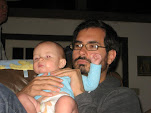Mike Davis, Planet of Slums
Stephen Graham, War and The City
Gilles Deleuzes, “Postscript on the Societies of Control”
Luic Waqant “The Militarization of Urban Marginality: Lessons from the Brazilian
Metropolis”, International Political Sociology, 2, 2008.
Suggested Film: Elite Squad, Weinstein Company, 2008. Available at Library or Video Americain
This section investigates recent trends in urbanization as containment and the resulting
militarization of police forces as well as the increasing urban training of military forces.
The goal of this section is to demonstrate how changes in the local and seemingly insular
urban environment have global security effects. We will also revisit the question of
structural versus subjective violence.
Tuesday, March 30, 2010
Monday, March 29, 2010
Week 8: The State Fights Back
David Galula, Counterinsurgency Warfare: Theory and Practice, Insurgency Praeger Security International 2006.(Kavanaugh)
David Kilcullen, Counter Insurgency REDUX
Nagl, Learning as we go
Compare the responses of Western powers to develop counter-insurgency tactics and the forces to carry them out. The focus will be on the French suppression of resistance in Algeria and the United States counter-insurgency methods. The texts themselves will represent very different ways to relate to this question. The first is a short, practical handbook written for military personnel by a participant in the French Army during the war for independence in Algeria. The other two articles are by advisors to the U.S. Military who helped developed our contemporary counter-insurgency doctrine.
David Kilcullen, Counter Insurgency REDUX
Nagl, Learning as we go
Compare the responses of Western powers to develop counter-insurgency tactics and the forces to carry them out. The focus will be on the French suppression of resistance in Algeria and the United States counter-insurgency methods. The texts themselves will represent very different ways to relate to this question. The first is a short, practical handbook written for military personnel by a participant in the French Army during the war for independence in Algeria. The other two articles are by advisors to the U.S. Military who helped developed our contemporary counter-insurgency doctrine.
Saturday, March 13, 2010
Week 7: Blood and Politics
Frantz Fanon, Wretched of the Earth, Grove Press "Concerning Violence" "Violence in the International Context" "Spontaneity: Its Strength and Weakness" pgs, 35-147 (Natalie)
Suggested Film: Battle of Algiers available on youtube.com (Danielle)
Focuses on Anti-Colonial uprisings and the philosophy of freedom and self-determination that animate those uprisings. Focusing primarily on the work of Frantz Fanon, the question of this week is why so many people would prefer violence and even death to the security of colonial administration. The response of those that believe that all individuals seek security would be that the colonial states were not adequately providing that security. While that may be true to a degree, desires for dignity and freedom often motivated those who benefited and lived well, materially, under colonialism to risk and even kill themselves in the pursuit of independence.
Suggested Film: Battle of Algiers available on youtube.com (Danielle)
Focuses on Anti-Colonial uprisings and the philosophy of freedom and self-determination that animate those uprisings. Focusing primarily on the work of Frantz Fanon, the question of this week is why so many people would prefer violence and even death to the security of colonial administration. The response of those that believe that all individuals seek security would be that the colonial states were not adequately providing that security. While that may be true to a degree, desires for dignity and freedom often motivated those who benefited and lived well, materially, under colonialism to risk and even kill themselves in the pursuit of independence.
Monday, March 1, 2010
Week 5: Marxism and Global Revolution
(Leora Brody and Ray)
Leon Trotsky, Terrorism and Communism, Verso 2007. ["The Balance of Power", "Democracy", "Terrorism", "The Paris Commune and Soviet Russia"]
Mao Zedong, On Practice and Contradiction, Verso, 2007. ["Introduction by Zizek", "A Single Spark Can Start A Prairie Fire", "On Practice", "Combat Liberalism", "The Chinese People Cannot Be Cowed by the Atom Bomb", and "US Imperialism is A Paper Tiger" (Min Kyu)
Ernesto “Che” Guevara, Guerrilla Warfare, Bison Books, 1998. "General Principles of Guerilla Warfare" pgs. 1-37]
International Solidarity, Weapons Surplus, and the Power of raw numbers (People with nothing to lose but their chains)
Week five will read and discuss Marxist revolution and counter-insurgency used to achieve revolutionary goals. This section will be draw on the earlier reading by Schmitt to determine how Marxism as a commitment to global rather than national equality and as a theory of human nature and freedom from economic alienation altered the strategies and tactics it pursued in these ends. For instance why notions of collective decision or freedom meant that much higher casualties were tolerated and why compromise and reform were not considered as alternatives to war and violence.
Leon Trotsky, Terrorism and Communism, Verso 2007. ["The Balance of Power", "Democracy", "Terrorism", "The Paris Commune and Soviet Russia"]
Mao Zedong, On Practice and Contradiction, Verso, 2007. ["Introduction by Zizek", "A Single Spark Can Start A Prairie Fire", "On Practice", "Combat Liberalism", "The Chinese People Cannot Be Cowed by the Atom Bomb", and "US Imperialism is A Paper Tiger" (Min Kyu)
Ernesto “Che” Guevara, Guerrilla Warfare, Bison Books, 1998. "General Principles of Guerilla Warfare" pgs. 1-37]
International Solidarity, Weapons Surplus, and the Power of raw numbers (People with nothing to lose but their chains)
Week five will read and discuss Marxist revolution and counter-insurgency used to achieve revolutionary goals. This section will be draw on the earlier reading by Schmitt to determine how Marxism as a commitment to global rather than national equality and as a theory of human nature and freedom from economic alienation altered the strategies and tactics it pursued in these ends. For instance why notions of collective decision or freedom meant that much higher casualties were tolerated and why compromise and reform were not considered as alternatives to war and violence.
Subscribe to:
Posts (Atom)
